US-Colombia Diplomatic Conflict: Migration, Tariffs, and Geopolitical Tensions
Updated on : 27 January, 2025
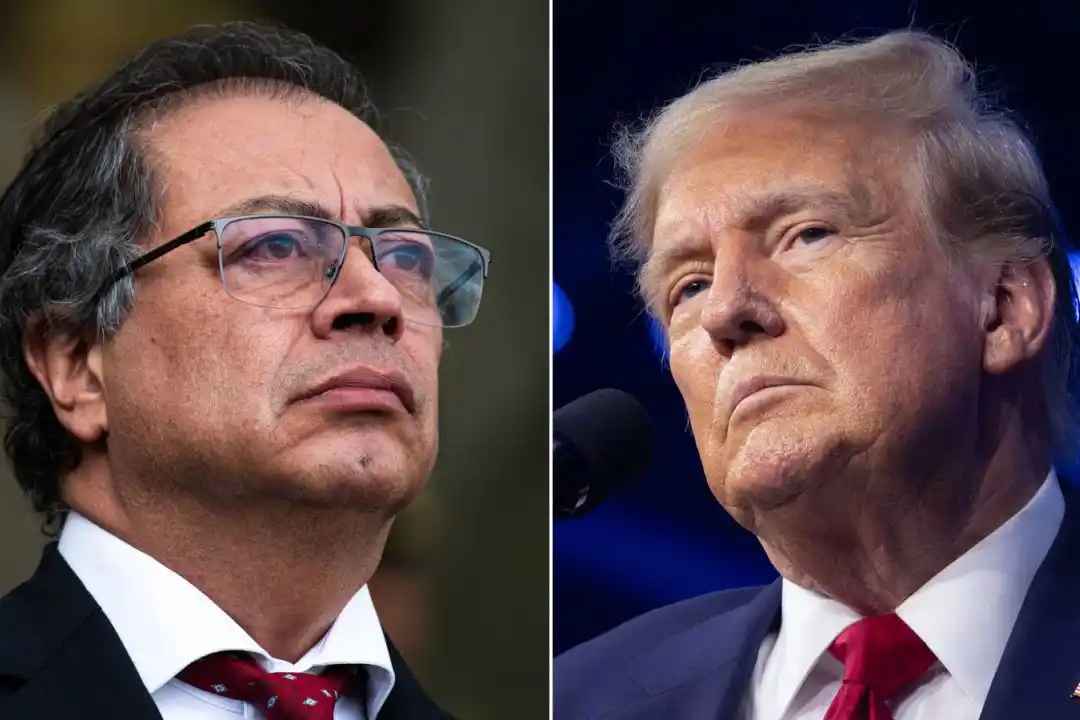
Image Source: Google.com
Overview of the Diplomatic Clash Between Colombia and the U.S.
The U.S.-Colombia diplomatic relationship, long grounded in anti-narcotics cooperation and trade agreements, has experienced a dramatic shift since January 2025. The escalation began when Colombian President Gustavo Petro denied U.S. military flights carrying deported migrants access to Colombian airspace. This move quickly prompted a forceful response from U.S. President Donald Trump, who ordered 25% tariffs on all Colombian goods as a punitive measure.
This growing conflict underscores the complexity of immigration policies while revealing the broader geopolitical tensions shaping U.S.-Latin American relations. As both nations exchanged sanctions and tariffs, the situation threatened to disrupt not only their trade ties but also the larger stability of the region.
The Context of the Conflict
Trump's Return to Power
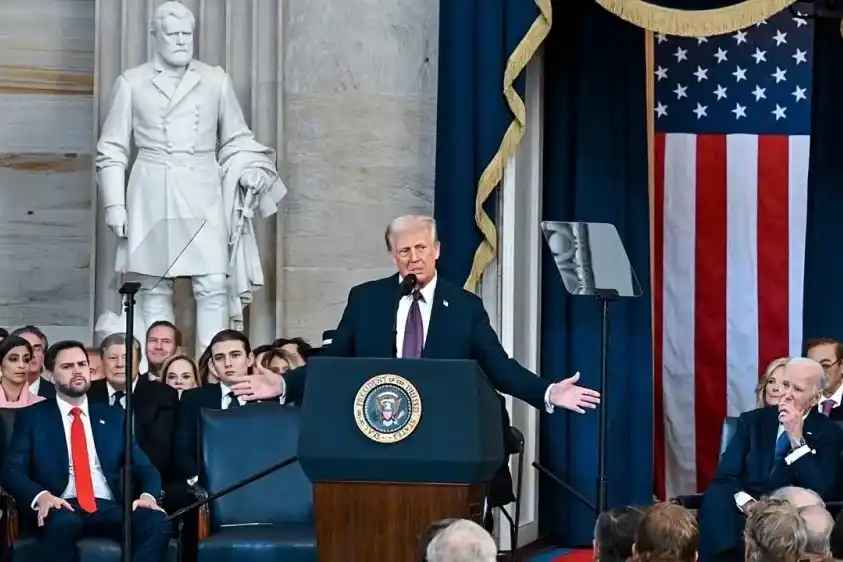
Image Source: Google.com
Donald Trump's re-election in November 2024 marked a pivotal shift in U.S. foreign policy, especially concerning Latin America. Renowned for his uncompromising stance on immigration, Trump's administration swiftly moved to strengthen its policies, emphasizing increased deportations and harsh measures against countries seen as uncooperative with U.S. immigration enforcement.
From the outset of his term, Trump made it clear that he intended to take a firm stance on immigration, interpreting Colombia's actions as a direct challenge to U.S. national security. His administration's strategy prominently featured the use of economic sanctions as a means of exerting diplomatic pressure.
Colombia's Stance on Migration
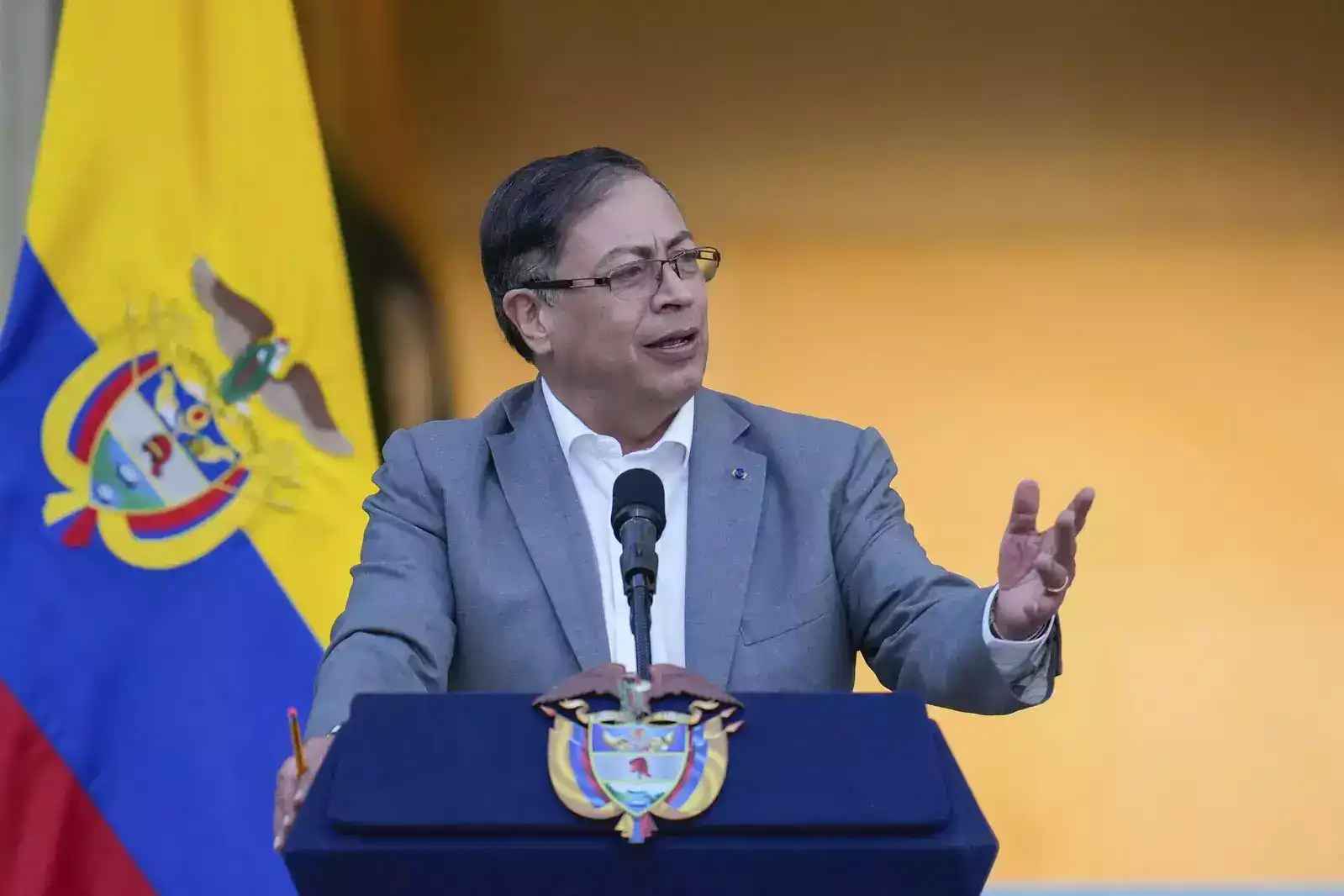
Image Source: Google.com
In sharp contrast to Trump's policies, President Gustavo Petro championed a more compassionate approach to migration. His administration prioritized treating returning migrants with dignity and respect, firmly stating that Colombian nationals should not be labeled or treated as criminals upon their return from the United States. Petro's decision to reject deportation flights from the U.S. military was deeply rooted in this philosophy, showcasing his commitment to human rights and the protection of national sovereignty.
Key Events Leading Up to the Sanctions
Denial of Deportation Flights
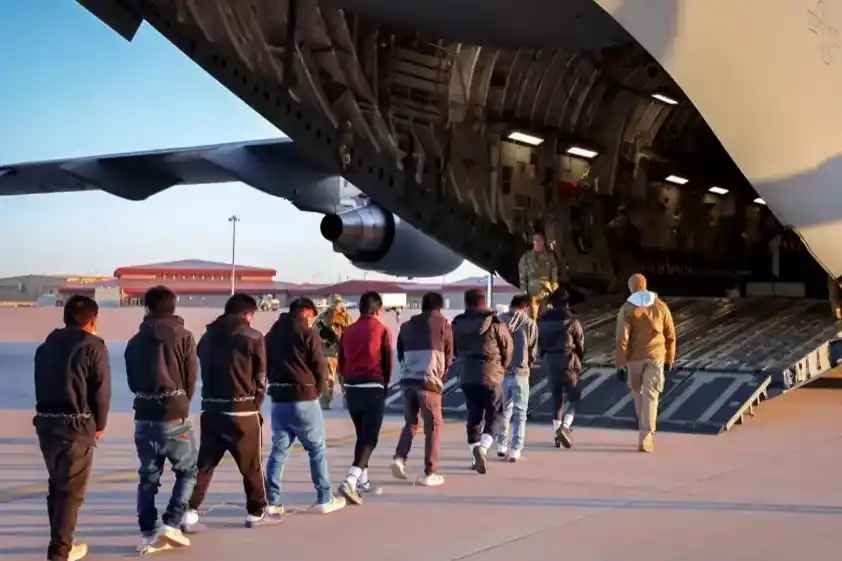
Image Source: Google.com
The immediate spark for the diplomatic conflict came on January 25, 2025, when Colombia blocked two U.S. military flights carrying deported migrants from landing. President Petro defended this move by emphasizing that the U.S. needed to establish proper protocols to ensure the dignified treatment of deported individuals.
This refusal was presented within the larger framework of Colombia's commitment to human rights, with Petro positioning himself as a staunch advocate for migrants' dignity in opposition to what he saw as Trump's harsh immigration policies.
Trump's Retaliatory Measures
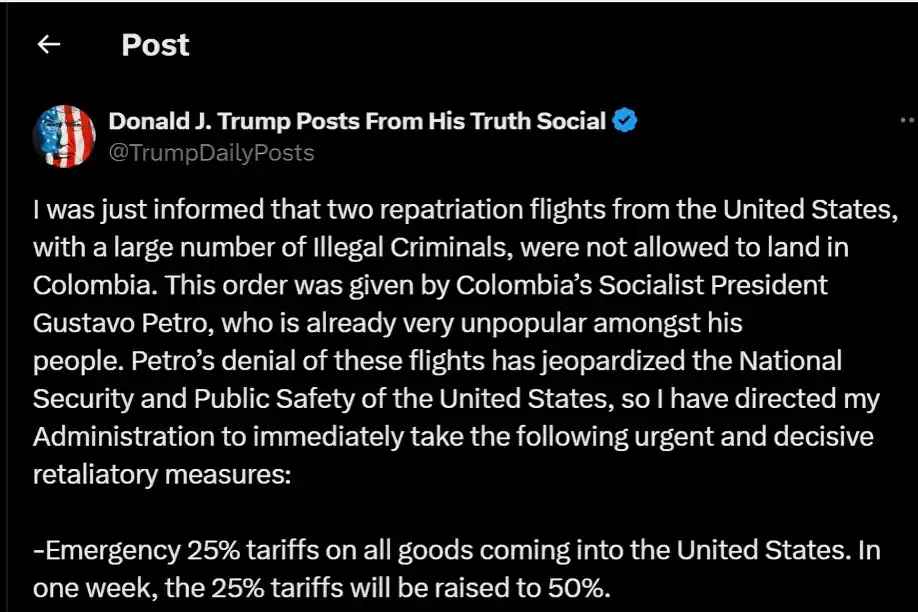
Image Source: Twitter
In retaliation to Colombia's refusal to allow the deportation flights, Trump announced a series of punitive measures on January 26, 2025:
- Tariffs: A 25% tariff was imposed on all Colombian imports entering the United States, with a plan to escalate it to 50% if Colombia failed to meet U.S. demands regarding deportations.
- Visa Restrictions: The Trump administration enacted travel bans and revoked visas for Colombian officials involved in blocking the deportation flights.
- Enhanced Inspections: Increased scrutiny was placed on both Colombian travelers and cargo entering the U.S., further escalating tensions between the two nations.
Trump framed these actions as critical measures to safeguard U.S. national security and enforce immigration laws.
Donald J. Trump Posts From His Truth Social wrote on X
Colombia's Counteractions
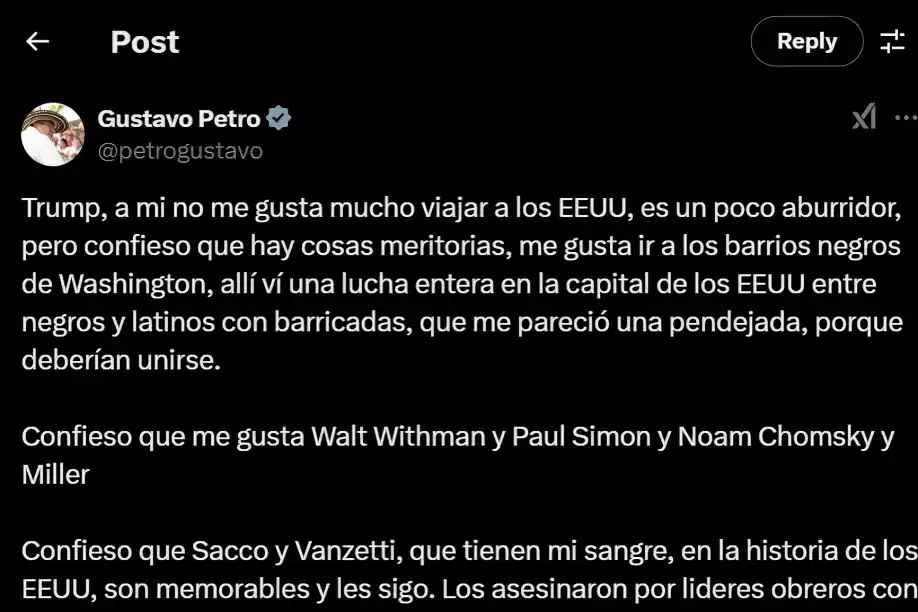
Image Source: Twitter
In response to Trump's sanctions, Colombia imposed equivalent tariffs on U.S. imports, demonstrating its readiness to engage in economic retaliation if required. This escalation underscored the growing risk of a full-blown trade war between two nations that had previously maintained strong economic ties.
Petro's administration stressed its dedication to safeguarding Colombian sovereignty and ensuring humane treatment for citizens returning from abroad. This position resonated with many Colombians, who saw Trump's actions as heavy-handed and unjust.
Gustavo Petro wrote on X
Petro’s Pushback: ‘Colombian Migrants Are Not Criminals’
President Petro's response to Trump's aggressive measures underscored his belief that Colombian migrants should not be criminalized upon their return from the United States. He communicated this stance through various social media posts and public statements, emphasizing that:
- Human Dignity: Migrants deserve respect and humane treatment, irrespective of their immigration status or the circumstances that led to their deportation.
- National Sovereignty: Colombia has the right to decide how to handle its citizens returning from abroad without being subjected to external pressure or coercion.
Petro's rhetoric positioned the issue not merely as a bilateral dispute but as part of a broader global struggle for human rights and dignity in migration policies.
Domestic Backlash in Colombia: Petro Faces Resistance at Home
While Petro's stance gained backing from human rights advocates and parts of Colombian society concerned about the treatment of migrants, it also faced significant domestic backlash:
- Political Opposition: Critics within Colombia accused Petro of endangering crucial economic ties with the United States, warning that his refusal to cooperate could have severe economic repercussions for Colombians who depend on trade with the U.S..
- Public Sentiment: Certain segments of the population voiced frustration over what they saw as government inefficiency in handling migration issues and maintaining strong international alliances.
This domestic resistance presented challenges for Petro's administration as it navigated complex international relations while attempting to retain public support at home.
Economic Fallout: How US Sanctions Could Impact Colombia
The imposition of tariffs and sanctions between the U.S. and Colombia carries significant economic consequences:
- Trade Disruption: As one of Colombia's largest trading partners, any U.S. tariffs could severely impact key Colombian exports like coffee, flowers, and textiles, which are vital to its economy.
- Inflationary Pressures: The increased costs resulting from tariffs could lead to higher prices for imported goods, fueling inflation in Colombia and directly affecting consumers.
- Investment Climate: The uncertainty surrounding trade relations could discourage foreign investment in Colombia, jeopardizing its long-term economic growth prospects.
Overall, these economic repercussions could worsen existing challenges within Colombia's economy and strain its relationship with one of its most crucial allies.
How Might This Dispute Impact Future U.S.-Colombia Trade Agreements?
The ongoing diplomatic clash raises important questions about the future of trade agreements between the United States and Colombia:
- Erosion of Trust: The imposition of tariffs signals a breakdown in trust between the two countries, which could complicate future trade negotiations.
- Potential for New Agreements: If tensions continue or escalate, both nations may reassess existing agreements or seek new frameworks that focus on different priorities—such as human rights versus national security.
- Regional Implications: Other Latin American countries may take note of this dispute as they negotiate their own trade agreements with the U.S., potentially shifting regional alliances based on views of fairness and cooperation.
Ultimately, how both nations handle this conflict will have lasting effects on their economic relationship in the future.
How Could This Trade War Impact the Global Economy?
The consequences of a trade war between the United States and Colombia extend well beyond their borders:
- Global Supply Chain Disruptions: Tariffs can interrupt established supply chains that depend on smooth trade between countries. Industries relying on Colombian exports may face shortages or higher costs.
- Inflationary Trends: As tariffs increase the prices of international goods, global inflation could rise, impacting purchasing power worldwide.
- Geopolitical Shifts: Nations observing this conflict may reconsider their own relationships with both the U.S. and Colombia, potentially altering alliances or trade partnerships on the global stage.
In conclusion, this trade war could significantly contribute to broader economic instability across multiple regions.
Public Reactions
Public opinion surrounding this diplomatic clash has been mixed:
- Support for Petro: A significant portion of Colombians backs President Petro's focus on human rights in migration policies, seeing it as an essential stand against perceived injustices from Trump’s administration.
- Criticism of Trump: On the other hand, many view Trump’s retaliatory measures as excessive and harmful, not only to bilateral relations but also to ordinary citizens who rely on stable trade relations.
- Calls for Dialogue: There is also an increasing call for dialogue instead of confrontation, with many urging both leaders to find common ground amid growing tensions.
These public reactions underscore how deeply domestic sentiments are linked to international diplomacy.
Literature and Legacy: Petro’s Marquez and Bolivar References
In his responses during this diplomatic conflict, President Petro drew on literary references from Gabriel García Márquez’s works—particularly "One Hundred Years of Solitude"—and historical figures like Simón Bolívar:
- Cultural Resonance: By invoking Márquez’s characters such as Colonel Aureliano Buendía, a revolutionary leader, Petro emphasized themes of resilience against oppression, reinforcing his commitment to national sovereignty.
- Historical Context: Referencing Bolívar allowed Petro to frame his opposition to Trump within a broader narrative of Latin American independence from foreign domination, using a powerful rhetorical strategy to rally domestic support while challenging external pressures.
Through these literary allusions, Petro aimed not only to assert his position but also to connect with cultural narratives deeply embedded in Colombian identity.
A Rocky Road Ahead: The Future of US-Colombia Relations
As tensions persist between the United States and Colombia over immigration policies and trade disputes:
- Ongoing Negotiations: Both nations have shown interest in reaching an agreement; however, achieving consensus will demand significant concessions from both sides on sensitive issues like migration protocols.
- Long-Term Implications: The current situation may set precedents for how future administrations handle bilateral relationships—not only between these two countries but across Latin America as a whole.
Ultimately, navigating this challenging path will require diplomatic skill from both leaders if they wish to restore stability in their relationship moving forward.
Conclusion
The recent clash between President Gustavo Petro of Colombia and President Donald Trump goes beyond a simple dispute over deportation flights; it embodies larger issues surrounding national sovereignty, human rights advocacy, and immigration enforcement policies. This conflict highlights the challenges faced by leaders trying to navigate increasingly complex international relations amid a rise in populism globally.
As both nations confront these emerging challenges—exemplified by tariffs and escalating tensions—it is crucial that dialogue takes precedence over confrontation. Only through constructive engagement can they hope to find resolution and restore stability within an interconnected global landscape fraught with uncertainty.



